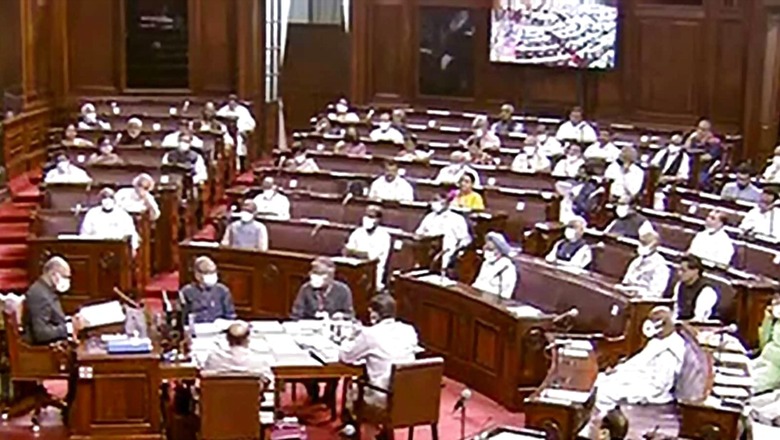
views
The Rajya Sabha Secretariat has directed various ministries to use gender-neutral terms beginning with the next Parliament session, reports have said. The decision was made in response to a letter written by Shiv Sena MP Priyanka Chaturvedi to Parliamentary Affairs Minister Prahlad Joshi, in which she asked Joshi to change the use of phrases such as ‘no sir,’ which is frequently used in House replies.
In a letter dated September 8, the Maharashtra MP expressed her “concern” about Parliament’s “institutional gender mainstreaming” as a “temple of democracy.” She urged the minister to issue appropriate instructions on how to address the concerned parliamentarians based on their gender.
The Rajya Sabha Secretariat responded to this letter by saying, “as per conventions and rules of procedure and conduct of business in Rajya Sabha, all the proceedings of the House are addressed to the Chair, and replies to Parliamentary questions being a part of proceedings are also addressed to the chairperson only. However, the ministries will be informed to furnish gender-neutral replies to the Parliamentary questions from the next session of Rajya Sabha onwards.” Chaturvedi said in a tweet thanking the Rajya Sabha for the initiative that even though it is a small step, it will make a big difference.
Amid the development, News18 takes a look at other international bodies around the world who have attempted gender-neutral wordings:
European Parliament
Words like “mankind” have been replaced by “humanity,” “manpower” by “staff,” and “man-made” by “synthetic” or “artificial,” in the European Parliament, according to a 2019 report. The EU body adopted multilingual gender-neutral language guidelines in 2008, and the 2019 set included a glossary of words and titles that avoided identifying someone’s gender or marital status.
“The European Parliament remains as committed as ever to the use of gender-neutral language in its written and spoken communications, and I now invite the relevant services to raise awareness of the updated guidelines and the importance of their use in parliamentary publications and communications,” Dimitrios Papadimoulis the European Parliament’s Vice-President and Chair of the High-Level Group on Gender Equality and Diversity had said.
According to the report, a multilingual environment, such as the European Parliament, should promote gender neutrality and inclusive language. Gender-neutral language is more than just a matter of political correctness, according to the guidelines. It “powerfully reflects and influences attitudes, behaviour, and perceptions.”
United Nations
The United Nations has issued guidelines to include a number of strategies to assist UN staff in using gender-inclusive language. They can be used to describe any type of communication, whether oral or written, formal or informal, or addressed to an internal or external audience, the UN says on its website.
There is a distinction in English between “grammatical gender,” “gender as a social construct” (which refers to the roles, behaviours, activities, and attributes that a given society considers appropriate for men or women at a given time), and “sex” as a biological characteristic of living beings, the UN explains in its guidelines.
The pronouns and possessives (he, she, her, and his), as well as some nouns and forms of address, are the only gender markers in English. Most English nouns lack grammatical gender forms (e.g., teacher, president), but a few are clearly masculine or feminine (e.g., actor/actress, waiter/waitress). Some nouns that used to end in -man now have gender-neutral equivalents (police officer for policeman/policewoman, spokesperson for spokesman, chair/chairperson for chairman), it says.
When referring to or addressing specific individuals, use pronouns and forms of address that correspond to their gender identity, the UN has directed to its staff, adding that they should check the intranet or the organisational or staff directory for United Nations personnel. If the staff member is addressed as “Ms.,” that is the correct form of address, and female pronouns are appropriate. Alternatively, and if the situation allows, you can ask the people you’re writing or addressing what pronouns and forms of address should be used for them, it says.
NATO
The NATO has in the past also come out with a manual for gender inclusive language. “Gendered language is important as it frames the understanding of equality. Gendered language shapes our views of women’s roles and directly impacts women’s participation in all aspects of society. Research highlights that gendered language can contribute to the marginalization of women in the labour market, impede educational attainment, reinforce traditional gender roles, and support harmful traditional practices. It can also empower, advance and promote equality between women and men,” the body says in its manual.
Some ways in which the body has tried to make its language gender-inclusive, as shared in the manual:


Read all the Latest Explainers News and Breaking News here




















Comments
0 comment